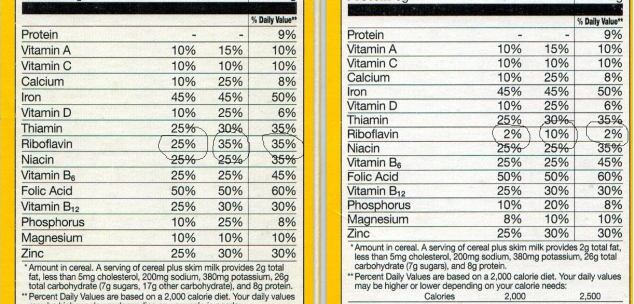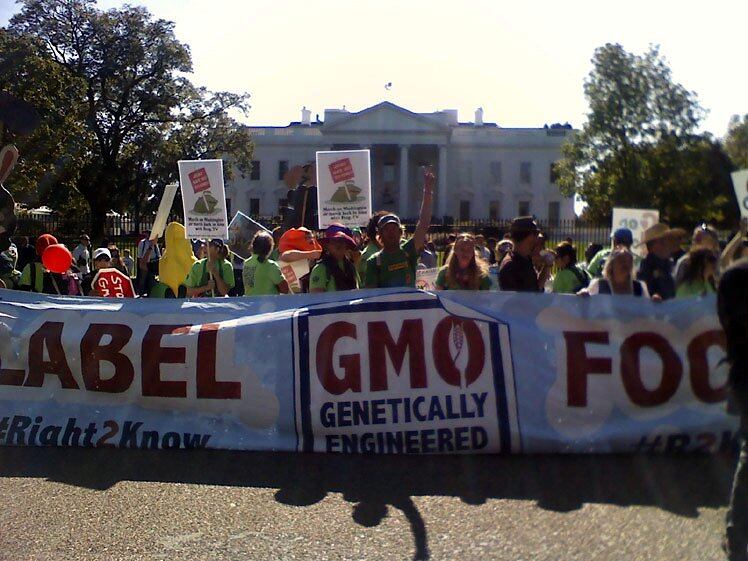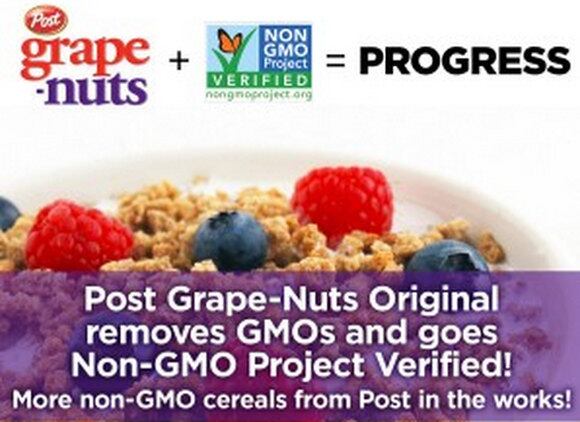Post Foods’ new non-GMO Grape Nuts (click here) no longer include Vitamin A, vitamin D, vitamin B12 or vitamin B2 (Riboflavin)*, while the new non-GMO Original Cheerios no longer have Riboflavin on the ingredients list (the old version has 25% of the daily value in a 28g serving while the new version has 2% of the DV).
Neither firm has responded to questions on why this is, or whether it has anything to do with the costs or challenges of going through the non-GMO Project verification process for the vitamins in question.
Dr Parrott: Cheerios went from being a major source of vitamin B2 to being almost zip
Dr Wayne Parrott, professor of crop science at the University of Georgia, said it was depressing to see that the new products are arguably less healthy given the lower vitamin content.
He told FoodNavigator-USA: “Cheerios went from being a major source of vitamin B2 to being almost zip."
This was particularly ironic given that a large percentage of people who say they are avoiding GMOs claim to do so for health reasons, he said.
“It is one thing for General Mills to say they took GM out [of Original Cheerios] due to customer preference.
"It is another to claim they are more wholesome because of it - something they are doing on the box itself and on their website - [he cites the fact that Original Cheerios’ non-GMO credentials are listed under the ‘Why they are so good’ heading on the website ‘], particularly when they took an important nutrient out of it almost completely.
“The new version is certainly less nutritious.”
General Mills told FoodNavigator-USA: "We don’t normally discuss product formulation. But we will note we made no assertion non-GM ingredients were ‘more wholesome.’ That is simply mistaken."

Vitamin production methods
But why might vitamins be made from or with GMOs in the first place?
Some vitamins are produced from genetically engineered micro-organisms, or from micro-organisms grown in fermentation tanks using feed stock from sugar beet or corn, which could potentially be from GM crops.
While many manufacturers - especially in China - are likely not using GM corn as a feedstock, "information on what country the corn in grown in is not standard and this level of documentation rigor has not been typical in the past", Bethany Davis, R&D/Regulatory Project Lead at dietary supplement firm MegaFood, told FoodNavigator-USA.
"So unless the question is asked and country of origin is confirmed, vitamins will generally be considered high-risk," said Davis.
Vitamins that can be produced via fermentation include vitamin B12, B2 (Riboflavin), ascorbic acid (vitamin C), and beta-carotene, while some forms of vitamin E can also be produced from soy (which might be GM).
Sourcing non-GMO vitamins
So how easy is it to source non-GMO versions?
They are certainly available, said Davis, who says the Non-GMO Dietary Supplement Working Group and Food Chain Global have helped the industry navigate this issue.
But it's complicated.
For example, beta carotene (which the body converts into Vitamin A), can be manufactured from synthetic or natural sources such as the fungus Blakeslea trispora, said Davis. A fermentation process is usually involved and because beta carotene can degrade over time, it is usually micro-encapsulated with corn starch, modified food starch, or glucose syrup (which can be made from corn), or vitamin E elements (which can be made from soy).
Therefore, she said, "It has proven to be quite difficult to ensure that all of the starting materials and additives in micro encapsulated beta carotene are non-GMO."
The information required for Non-GMO Project Verification can be quite difficult to obtain
Meanwhile, if you want a third-party seal of approval for your non-GMO sourcing efforts, there are "completely different requirements which are not industry-standard at this time", added Davis, who has worked with the Non-GMO Project to get its seal on 42 of its products to date.
"The information required for Non-GMO Project Verification can be quite difficult to obtain as it generally requires information that manufacturers consider proprietary. Vitamin manufacturers hold their formulas close to their heart because it is all that separates them from their competitors."

The supply chain doesn't change overnight
She added: "[Leading vitamin supplier] DSM has had some success in providing adequate information to Non-GMO Project participants and Food Chain Global, the technical administrators for the Project, to allow their vitamins to be used in Non-GMO Project Verified products...
"In time we believe the type of information they require will become standardized; however at the moment, it’s a process - ingredient by ingredient."
Davis could not comment on Post Foods or General Mills, but noted that "for a large manufacturer that uses high volumes of a given nutritional ingredient like vitamins, the demand - and potential sales for the vitamin manufacturer - is high enough that they can likely find ingredient partners that are willing to produce vitamins to their specifications."
NPD Group: Shoppers won’t pay more for non-GMO
Her comments came as market researcher NPD Group said a consumer survey had shown that 67% of primary grocery shoppers are not willing to pay more for non-GMO foods, although more than half expressed “some level of concern” about GMOs.
There is, however, a subset of shoppers who are willing to pay more, which amounts to about 11% of all primary shoppers, claimed NPD Group.
Hartman Group: No single GMO story line has emerged for consumers

Trendwatcher Hartman Group, meanwhile, claimed that “if companies do not start speaking more openly about GMOs, they could lose their place in the conversation altogether”.
It added: “The power of social media, in particular, could quickly overwhelm any message that food companies want to convey once information or misinformation start taking hold."
Most who claim to avoid GMO say it is for health reasons
While it acknowledged that what consumers say - and what they do - can be quite different, the anti-GMO trend is “undeniable”, claimed Hartman Group, which polled 2,551 US adults last September about GMOs.
“The percentage of consumers who deliberately avoid GMOs is 33% and growing quickly. Only 15% avoided GMOs in 2007."
Among people who claimed to be avoiding GMOs, 70% said it was because they were concerned about the impact on their health and well-being, while half said they want to know what goes into their food. Meanwhile, 36% were concerned about possible environmental impacts and 30% did not want to support companies that use GMOs.
*Post Foods will not say why the reformulated Grape Nuts contain four fewer vitamins, but sent us this statement: "The recipe was modified slightly, but still contains the signature crunch and 49g of whole grains... Grape-Nuts Original now has 45g of carbs per serving and no longer includes Vitamin A, Vitamin D, Riboflavin, and B12."
